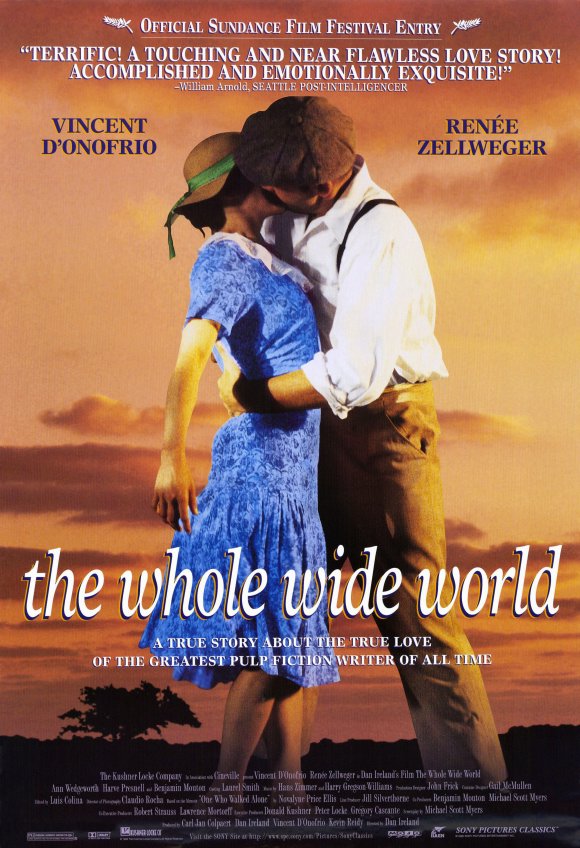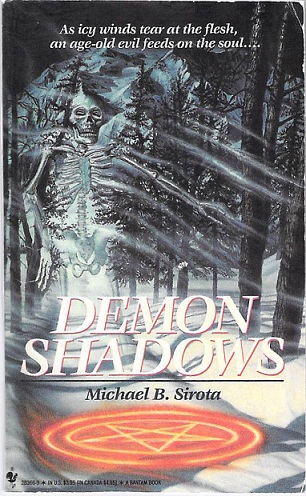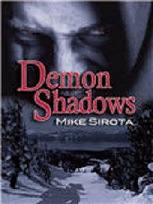Okay, I don’t mean to belittle a malady that is prevalent among so many writers. It’s just that I’ve never had writer’s block. I mean, never. Not ever. I will admit that there were periods when life got in the way big time, and accordingly I just stopped writing. But it was never for want of a scene, or a character, or anything like that.
If I suffered from anything during my career(s) it might have been writer’s run-off. An overflow of scenes, characters, plot points, settings, you name it, all of which just kept on a-comin’. Turning off that portion of my brain proved difficult during those periods when I pounded out chapter after chapter, book after book, series after series. I even took it to bed with me and dreamt a lot of what would wind up on paper the following morning. Twelve-, fifteen-, twenty-hour marathons at the keyboard were nothing for me.
For a visual image of what that might look like, get yourself a copy of the wonderful movie, The Whole Wide World. It’s the true story of a woman’s relationship with Robert E. Howard, the author of the Conan stories, as well as many others. Howard often wrote upwards of 5,000 words a day. In one scene  the woman (a young Renée Zellweger) approaches Howard’s house to talk to him. She hears what sounds like frenzied narration, and when she looks through a window she sees Howard at the typewriter, reciting his story and pounding the keys like a madman. You’ll understand. It’s an awesome scene.
the woman (a young Renée Zellweger) approaches Howard’s house to talk to him. She hears what sounds like frenzied narration, and when she looks through a window she sees Howard at the typewriter, reciting his story and pounding the keys like a madman. You’ll understand. It’s an awesome scene.
One of those periods where life got in the way occurred in the late 1980s, just prior to and after a divorce. I wrote nothing new for about two years, maybe longer. Now, being single for the first time in forever had its high points, but my ex-wife had taken our three daughters and moved up to L.A., while I remained in San Diego. And while I did see them every couple of weeks, there were times when it was not easy being alone.
So, when I finally decided that the time had come to emerge from my writing funk, I chose a Native American-themed horror novel that would eventually be titled Demon Shadows and see publication a couple of years later by Bantam Books. For my main character I chose a (guess what) thriller writer named Paul Fleming who is suffering from (guess what) writer’s block on a career-stalling scale after  going through a (guess what) divorce and (guess what) missing his kids. Here are the first words that I wrote after a two-plus-year hiatus:
going through a (guess what) divorce and (guess what) missing his kids. Here are the first words that I wrote after a two-plus-year hiatus:
November 28, 1991 — Thanksgiving
The clock read 8:07.
Damn digital clock, Paul Fleming thought. They used to make round clocks with numbers spaced apart, and hands that moved. A lot of the clocks ticked. Looking at them you thought of time in descriptive terms: almost seven, a little after four, half past noon. And the round ones weren’t on your VCR or microwave oven, your pen or pocket calculator.
Now time was precisely 11:32, or 5:49, or 2:12.
Or 8:07. You seemed to notice it more when you were alone.
Paul figured it could be worse. Some of them read 8:07:42, then :43, :44 . . . This one wasn’t so explicit. Just the hour and minute, just . . . 8:08.
Alone was the big damn half-empty Laguna Hills condo he’d taken after they’d sold the house. He had moved out first, even though Jeannie had started the whole divorce business. That had bothered him, thinking what it might mean to Jason and Bree. But they understood pretty well, though only ten and eight years old. They had been included all along and knew that Dad wasn’t leaving . . . that no one was leaving them.
Alone was listening to children playing on the grounds below and knowing that none of them were Jason and Bree. It was looking at their latest artwork, held up by magnets on the refrigerator. It was talking to them on the phone every few nights, then hanging up and wondering why you couldn’t help with that week’s spelling words, or play zip- the-lip and try not to crack up, or read a couple chapters from Charlie and the Chocolate Factory. It was driving to John Wayne Airport to put them back on a plane to San Francisco every third Sunday evening, trying not to think about how long till the next time.
the-lip and try not to crack up, or read a couple chapters from Charlie and the Chocolate Factory. It was driving to John Wayne Airport to put them back on a plane to San Francisco every third Sunday evening, trying not to think about how long till the next time.
Alone was Paul Fleming’s new state of being, achieved in his thirty-sixth year of life and — ironically — coming right after the success for which he had worked so hard. He accepted it now, because he knew that Jeannie had done the right thing. More, as hard as it was to admit, it was what he too had needed.
Jason and Bree were with the right parent. As much as he loved his kids, he could not deny that truth. All the times he hadn’t been there for them — or Jeannie — working meaningless but necessary jobs, writing his stories, his pieces of dreams that never seemed to fit together, until finally they did.
But by then, Jeannie was gone.
Pushed away first, slowly, steadily, over years. Then pulled by a growing consciousness of who and what she was, of her changing needs. That had become the legacy of their earlier life together, a time when they depended so much on each other, and a time of a deep love that had been so good.
The old dream was real now. Three successful novels, one made into a blockbuster movie; a lucrative contract for more books. Everything that he had wanted.
So why hadn’t he written a word in eight months? Or jotted down one workable storyline? Or even just polish some old material that would probably sell now?
He had played a mind game with himself: Writing is the great catharsis, the consummate purge of emotions. This experience will draw the best from the deepness of my soul. And it will help take my mind off what I’m going through.
What bullshit.
Writer’s block was an affliction that log-jammed writers at a word, a sentence, a chapter. Paul’s logjam had become his career. And the worst part: he couldn’t seem to give a damn.
Eventually, this scene became the opening of chapter two. The first chapter, written later on, takes us back to the 1840s, when the Thorburn Party becomes stranded in the Sierras and does something rather horrifying to survive. That, of course, was fiction. Paul’s internal monologue was not. A cathartic experience for me—and it opened up the floodgates once again.
But what about the writer’s block that Paul was experiencing? Seems that on the same spot in the mountains where the Thorburn Party met their destiny, a writers’ and artists’ colony now exists. Paul’s agent sends him there for a month to get his mojo back, and it actually works, until…

Yaddo is a renowned writers’ colony in Saratoga Springs, NY.
Writers’ colonies, writers’ retreats, even writers’ conferences serve a writer well in dismantling the dam to creativity. I also offer a day-to-day quick fix to writer’s block: walk away from your keyboard. Close up your laptop. Put away the pad and pencil. Take a long walk (I do that all the time). Play with your dog, or your kids. Go surfing—or ice fishing. In other words, do anything but stare at a blank screen and aggravate yourself. It’s like hitting the “Refresh” button in your brain. Your mojo will not have wandered too far.
How about a freebie for Demon Shadows? It can be downloaded on any Kindle device on Thursday, October 11th. And ditto for another one of my horror novels, The Modoc Well, on Saturday, October 13th. This is another Native American- themed story, first published by Bantam, and the main character, Greg Lowell, is a (guess what) publishing house editor. Enjoy!
themed story, first published by Bantam, and the main character, Greg Lowell, is a (guess what) publishing house editor. Enjoy!

As I’ve already enjoyed those two great books, all I can say is that I’d have to think twice before going to Yaddo for a writers retreat after what happened to your character, Paul Fleming.
And, no, I’m not confusing the two places. I was quite taken by the photo of the main building at Yaddo and went looking for additional pix of the grounds. While the whole property is lovely, the little bit I read about the Trask family (who built the place) makes me think there could be a few ghosts hanging around there! Of course, that would be right up your alley (or dark corner of choice).
I’ve never had writer’s block in anything like the classic sense, but there have been times when complicated plot lines got so tangled up in my head that I thought I’d never work them all free. Quite by accident, I discovered something that seems incredibly silly, but has worked far too many times for me to discount it now.
I take a shower, during which I must wash my hair. I’m not kidding, cross my heart. There is something about physically rubbing/massaging my head in the shampooing process that gets my thoughts unstuck ,and the answer to the puzzle almost always comes tumbling out before I turn off the water…and it’s often something I was not even considering before. I hope I never do get writer’s block, because I’d end up a prune….
Whoa, washing your hair… Like I said, Kate, whatever works. Thanks for sharing.
I don’t believe in writers’ block, but I do believe in life block. I also relate to run off syndrome. 😉 Ha! Great post.
Thanks, August. There are worse “diseases” to have than writers’ run-off. 🙂 The flow of our creativity is what keeps us going.